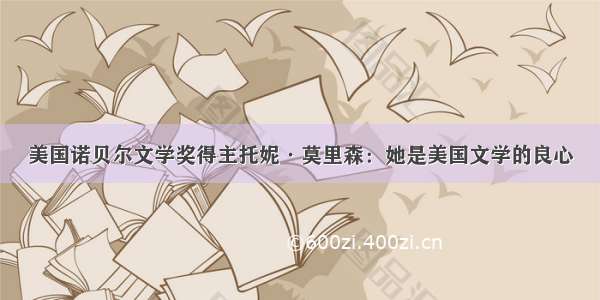
当我走进这间大厅时我的脑子里萦回着那些在我之前走进这里的人士的身影。我能和那些桂冠文人为伍使我感到畏怯和欢悦,因为在那个行列中的一些名家的力作曾把整个世界展现在我的面前。他们那挥洒自如与别具风格的笔触,以其真知灼见之清晰和勇气使我有时感动得为之心碎。他们在写作中所显示的惊人才华对我又是挑战、又是培育。我对他们的感激正如我对瑞典学院把我挑选出来参加到这显赫的行列中来的深切感激正好相似。
早在十月间,一位艺术界的朋友给我一个留言,被我储存在留言机里好几个星期。我不时反复把它重放,只是为了再聆听一次她由于高兴而有些颤抖的音调和那道出真情的语句:"你获得的大奖也是我们大家的;你是再合适不过的人选了。"她在这句话里流露的大功告成的欢悦和崇高的信任代替我纪念了这难忘的今日。
但当我离开这间大厅时,我将带着比我走进时更为新鲜、更加高兴的心情,那是一种将与今后的桂冠才人站在同一行列的欢悦心情。甚至就在我讲话的此刻,他们正在挖掘、筛选、润色着他们的作品语言,以便来照亮我们这里谁都还未曾梦想到的世界。但是,不管在他们当中有谁能获得这个圣殿中的一个席位,这个作家群将会越聚越多则是肯定无疑的。他们的声音将会道出已逝和未来的种种文明;他们站在高高的悬崖上所作的幻想的凝视将会吸引住我们大家的目光;而他们将目不转睛、决不回避。
因此,我是在牢记我们前辈的才华、我的姐妹们的祝福并在迎接着未来的作家的出现的心情中接受瑞典学院赋予我的荣誉的,并请诸位和我来同享这光彩的一刻。
NobelLecture
by ToniMorrison
Nobel Prize inLiterature 1993
December 8,1993 at at Stockholm Concert Hall, Stockholm,Sweden
"Once upon atime there was an old woman. Blind but wise." Or was it an old man?A guru, perhaps. Or a griot soothing restless children. I haveheard this story, or one exactly like it, in the lore of severalcultures.
"Once upon atime there was an old woman. Blind.Wise."
In the versionI know the woman is the daughter of slaves, black, American, andlives alone in a small house outside of town. Her reputation forwisdom is without peer and without question. Among her people sheis both the law and its transgression. The honor she is paid andthe awe in which she is held reach beyond her neighborhood toplaces far away; to the city where the intelligence of ruralprophets is the source of muchamusement.
One day thewoman is visited by some young people who seem to be bent ondisproving her clairvoyance and showing her up for the fraud theybelieve she is. Their plan is simple: they enter her house and askthe one question the answer to which rides solely on her differencefrom them, a difference they regard as a profound disability: herblindness. They stand before her, and one of them says, "Old woman,I hold in my hand a bird. Tell me whether it is living ordead."
She does notanswer, and the question is repeated. "Is the bird I am holdingliving or dead?"
Still shedoesn't answer. She is blind and cannot see her visitors, let alonewhat is in their hands. She does not know their color, gender orhomeland. She only knows theirmotive.
The old woman'ssilence is so long, the young people have trouble holding theirlaughter.
Finally shespeaks and her voice is soft but stern. "I don't know", she says."I don't know whether the bird you are holding is dead or alive,but what I do know is that it is in your hands. It is in yourhands."
Her answer canbe taken to mean: if it is dead, you have either found it that wayor you have killed it. If it is alive, you can still kill it.Whether it is to stay alive, it is your decision. Whatever thecase, it is your responsibility.
For paradingtheir power and her helplessness, the young visitors arereprimanded, told they are responsible not only for the act ofmockery but also for the small bundle of life sacrificed to achieveits aims. The blind woman shifts attention away from assertions ofpower to the instrument through which that power isexercised.
Speculation onwhat (other than its own frail body) that bird-in-the-hand mightsignify has always been attractive to me, but especially so nowthinking, as I have been, about the work I do that has brought meto this company. So I choose to read the bird as language and thewoman as a practiced writer. She is worried about how the languageshe dreams in, given to her at birth, is handled, put into service,even withheld from her for certain nefarious purposes. Being awriter she thingks of language partly as a system, partly as aliving thing over which one has control, but mostly as agency--asan act with consequences. So the question the children put to her:"Is it living or dead?" is not unrea1 because she thinks oflanguage as susceptible to death, erasure; certainly imperiled andsalvageable only by an effort of the will. She believes that if thebird in the hands of her visitors is dead the custodians areresponsible for the corpse. For her a dead language is not only oneno longer spoken or written, it is unyielding language content toadmire its own paralysis. Like statist language, censored andcensoring. Ruthless in its policing duties, it has no desire orpurpose other than maintaining the free range of its own narcoticnarcissism, its own exclusivity and dominance. However moribund, itis not without effect for it actively thwarts the intellect, stallsconscience, suppresses human potential. Unreceptive tointerrogation, it cannot form or tolerate new ideas, shape otherthoughts, tell another story, fill baffling silences. Officiallanguage smitheryed to sanction ignorance and preserve privilege isa suit of armor polished to shocking glitter, a husk from which theknight departed long ago. Yet there it is: dumb, predatory,sentimental. Exciting reverence in schoolchildren, providingshelter for despots, summoning false memories of stability, harmonyamong the public.
She isconvinced that when language dies, out of carelessness, disuse,indifference and absence of esteem, or killed by fiat, not only sheherself, but all users and makers are accountable for its demise.In her country children have bitten their tongues off and usebullets instead to iterate the voice of speechlessness, of disabledand disabling language, of language adults have abandonedaltogether as a device for grappling with meaning, providingguidance, or expressing love. But she knows tongue-suicide is notonly the choice of children. It is common among the infantile headsof state and power merchants whose evacuated language leaves themwith no access to what is left of their human instincts for theyspeak only to those who obey, or in order to forceobedience.
The systematiclooting of language can be recognized by the tendency of its usersto forgo its nuanced, complex, mid-wifery properties for menace andsubjugation. Oppressive language does more than represent violence;it is violence; does more than represent the limits of knowledge;it limits knowledge. Whether it is obscuring state language or thefaux-language of mindless media; whether it is the proud butcalcified language of the academy or the commodity driven languageof science; whether it is the malign language oflaw-without-ethics, or language designed for the estrangement ofminorities, hiding its racist plunder in its literary cheek--itmust be rejected, altered and exposed. It is the language thatdrinks blood, laps vulnerabilities, tucks its fascist boots undercrinolines of respectability and patriotism as it movesrelentlessly toward the bottom line and the bottomed-out mind.Sexist language, racist language, theistic language--all aretypical of the policing languages of mastery, and cannot, do notpermit new knowledge or encourage the mutual exchange ofideas.
The old womanis keenly aware that no intellectual mercenary, nor insatiabledictator, no paid-for politician or demagogue; no counterfeitjournalist would be persuaded by her thoughts. There is and will berousing language to keep citizens armed and arming; slaughtered andslaughtering in the malls, courthouses, post offices, playgrounds,bedrooms and boulevards; stirring, memorializing language to maskthe pity and waste of needless death. There will be more diplomaticlanguage to countenance rape, torture, assassination. There is andwill be more seductive, mutant language designed to throttle women,to pack their throats like paté-producing geese with their ownunsayable, transgressive words; there will be more of the languageof surveillance disguised as research; of politics and historycalculated to render the suffering of millions mute; languageglamorized to thrill the dissatisfied and bereft into assaultingtheir neighbors; arrogant pseudo-empirical language crafted to lockcreative people into cages of inferiority andhopelessness.
Underneath theeloquence, the glamor, the scholarly associations, however stirringor seductive, the heart of such language is languishing, or perhapsnot beating at all--if the bird is alreadydead.
She has thoughtabout what could have been the intellectual history of anydiscipline if it had not insisted upon, or been forced into, thewaste of time and life that rationalizations for andrepresentations of dominance required--lethal discourses ofexclusion blocking access to cognition for both the excluder andthe excluded.
Theconventional wisdom of the Tower of Babel story is that thecollapse was a misfortune. That it was the distraction, or theweight of many languages that precipitated the tower's failedarchitecture. That one monolithic language would have expedited thebuilding and heaven would have been reached. Whose heaven, shewonders? And what kind? Perhaps the achievement of Paradise waspremature, a little hasty if no one could take the time tounderstand other languages, other views, other narratives period.Had they, the heaven they imagined might have been found at theirfeet. Complicated, demanding, yes, but a view of heaven as life;not heaven as post-life.
She would notwant to leave her young visitors with the impression that languageshould be forced to stay alive merely to be. The vitality oflanguage lies in its ability to limn the actual, imagined andpossible lives of its speakers, readers, writers. Although itspoise is sometimes in displacing experience it is not a substitutefor it. It arcs toward the place where meaning may lie. When aPresident of the United States thought about the graveyard hiscountry had become, and said, "The world will little note nor longremember what we say here. But it will never forget what they didhere," his simple words are exhilarating in their life-sustainingproperties because they refused to encapsulate the reality of 600,000 dead men in a cataclysmic race war. Refusing to monumentalize,disdaining the "final word", the precise "summing up",acknowledging their "poor power to add or detract", his wordssignal deference to the uncapturability of the life it mourns. Itis the deference that moves her, that recognition that language cannever live up to life once and for all. Nor should it. Language cannever "pin down" slavery, genocide, war. Nor should it yearn forthe arrogance to be able to do so. Its force, its felicity is inits reach toward the ineffable.
Be it grand orslender, burrowing, blasting, or refusing to sanctify; whether itlaughs out loud or is a cry without an alphabet, the choice word,the chosen silence, unmolested language surges toward knowledge,not its destruction. But who does not know of literature bannedbecause it is interrogative; discredited because it is critical;erased because alternate? And how many are outraged by the thoughtof a self-ravaged tongue?
Word-work issublime, she thinks, because it is generative; it makes meaningthat secures our difference, our human difference--the way in whichwe are like no other life.
We die. Thatmay be the meaning of life. But we do language. That may be themeasure of our lives.
"Once upon atime, . . ." visitors ask an old woman a question. Who are they,these children? What did they make of that encounter? What did theyhear in those final words: "The bird is in your hands"? A sentencethat gestures towards possibility or one that drops a latch?Perhaps what the children heard was "It's not my problem. I am old,female, black, blind. What wisdom I have now is in knowing I cannothelp you. The future of language isyours."
They standthere. Suppose nothing was in their hands? Suppose the visit wasonly a ruse, a trick to get to be spoken to, taken seriously asthey have not been before? A chance to interrupt, to violate theadult world, its miasma of discourse about them, for them, butnever to them? Urgent questions are at stake, including the onethey have asked: "Is the bird we hold living or dead?" Perhaps thequestion meant: "Could someone tell us what is life? What isdeath?" No trick at all; no silliness. A straightforward questionworthy of the attention of a wise one. An old one. And if the oldand wise who have lived life and faced death cannot describeeither, who can?
But she doesnot; she keeps her secret; her good opinion of herself; her gnomicpronouncements; her art without commitment. She keeps her distance,enforces it and retreats into the singularity of isolation, insophisticated, privileged space.
Nothing, noword follows her declaration of transfer. That silence is deep,deeper than the meaning available in the words she has spoken. Itshivers, this silence, and the children, annoyed, fill it withlanguage invented on the spot.
"Is there nospeech," they ask her, "no words you can give us that helps usbreak through your dossier of failures? Through the education youhave just given us that is no education at all because we arepaying close attention to what you have done as well as to what youhave said? To the barrier you have erected between generosity andwisdom?
"We have nobird in our hands, living or dead. We have only you and ourimportant question. Is the nothing in our hands something you couldnot bear to contemplate, to even guess? Don't you remember beingyoung when language was magic without meaning? When what you couldsay, could not mean? When the invisible was what imagination stroveto see? When questions and demands for answers burned so brightlyyou trembled with fury at notknowing?
"Do we have tobegin consciousness with a battle heroines and heroes like you havealready fought and lost leaving us with nothing in our hands exceptwhat you have imagined is there? Your answer is artful, but itsartfulness embarrasses us and ought to embarrass you. Your answeris indecent in its self-congratulation. A made-for-televisionscript that makes no sense if there is nothing in ourhands.
"Why didn't youreach out, touch us with your soft fingers, delay the sound bite,the lesson, until you knew who we were? Did you so despise ourtrick, our modus operandi you could not see that we were baffledabout how to get your attention? We are young. Unripe. We haveheard all our short lives that we have to be responsible. Whatcould that possibly mean in the catastrophe this world has become;where, as a poet said, "nothing needs to be exposed since it isalready barefaced." Our inheritance is an affront. You want us tohave your old, blank eyes and see only cruelty and mediocrity. Doyou think we are stupid enough to perjure ourselves again and againwith the fiction of nationhood? How dare you talk to us of dutywhen we stand waist deep in the toxin of yourpast?
"You trivializeus and trivialize the bird that is not in our hands. Is there nocontext for our lives? No song, no literature, no poem full ofvitamins, no history connected to experience that you can passalong to help us start strong? You are an adult. The old one, thewise one. Stop thinking about saving your face. Think of our livesand tell us your particularized world. Make up a story. Narrativeis radical, creating us at the very moment it is being created. Wewill not blame you if your reach exceeds your grasp; if love soignites your words they go down in flames and nothing is left buttheir scald. Or if, with the reticence of a surgeon's hands, yourwords suture only the places where blood might flow. We know youcan never do it properly--once and for all. Passion is neverenough; neither is skill. But try. For our sake and yours forgetyour name in the street; tell us what the world has been to you inthe dark places and in the light. Don't tell us what to believe,what to fear. Show us belief s wide skirt and the stitch thatunravels fear's caul. You, old woman, blessed with blindness, canspeak the language that tells us what only language can: how to seewithout pictures. Language alone protects us from the scariness ofthings with no names. Language alone ismeditation.
"Tell us whatit is to be a woman so that we may know what it is to be a man.What moves at the margin. What it is to have no home in this place.To be set adrift from the one you knew. What it is to live at theedge of towns that cannot bear yourcompany.
"Tell us aboutships turned away from shorelines at Easter, placenta in a field.Tell us about a wagonload of slaves, how they sang so softly theirbreath was indistinguishable from the falling snow. How they knewfrom the hunch of the nearest shoulder that the next stop would betheir last. How, with hands prayered in their sex, they thought ofheat, then sun. Lifting their faces as though is was there for thetaking. Turning as though there for the taking. They stop at aninn. The driver and his mate go in with the lamp leaving themhumming in the dark. The horse's void steams into the snow beneathits hooves and its hiss and melt are the envy of the freezingslaves.
"The inn dooropens: a girl and a boy step away from its light. They climb intothe wagon bed. The boy will have a gun in three years, but now hecarries a lamp and a jug of warm cider. They pass it from mouth tomouth. The girl offers bread, pieces of meat and something more: aglance into the eyes of the one she serves. One helping for eachman, two for each woman. And a look. They look back. The next stopwill be their last. But not this one. This one iswarmed."
It's quietagain when the children finish speaking, until the woman breaksinto the silence.
"Finally", shesays, "I trust you now. I trust you with the bird that is not inyour hands because you have truly caught it. Look. How lovely itis, this thing we have done--together."
















